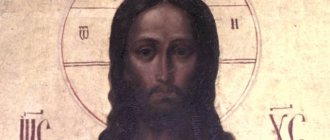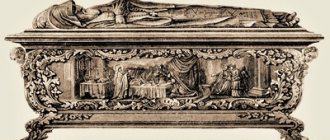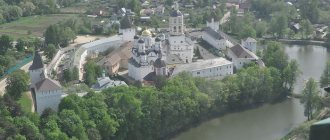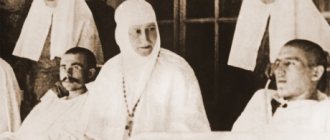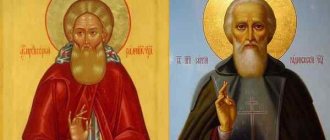Akathist to the Holy Venerable Ambrose, Elder of Optina and Wonderworker
Alexander Grenkov, the future father Ambrose, was born on November 21 or 23, 1812 in the spiritual family of the village of Bolshiye Lipovitsy, Tambov diocese. Having graduated from theological school, he then successfully completed a course at the theological seminary. However, he did not go to the Theological Academy or become a priest. For some time he was a home teacher in a landowner family, and then a teacher at the Lipetsk Theological School. Possessing a lively and cheerful character, kindness and wit, Alexander Mikhailovich was very loved by his comrades and colleagues. In his last year at the seminary, he had to suffer a dangerous illness, and he vowed to become a monk if he recovered.
Upon recovery, he did not forget his vow, but for several years he put off fulfilling it, “repenting,” as he put it. However, his conscience did not give him peace. And the more time passed, the more painful the remorse became. Periods of carefree fun and carelessness were followed by periods of acute melancholy and sadness, intense prayer and tears. Once, when he was already in Lipetsk, walking in a nearby forest, he, standing on the bank of a stream, clearly heard in its murmur the words: “Praise God, love God...”
At home, secluded from prying eyes, he fervently prayed to the Mother of God to enlighten his mind and direct his will. In general, he did not have a persistent will and already in old age he said to his spiritual children: “You must obey me from the first word. I am a compliant person. If you argue with me, I may give in to you, but it will not be to your benefit.” Exhausted by his indecision, Alexander Mikhailovich went for advice to the famous ascetic Hilarion, who lived in that area. “Go to Optina,” the elder told him, “and you will be experienced.” Grenkov obeyed. In the fall of 1839, he arrived in Optina Pustyn, where he was kindly received by Elder Leo.
Soon he took monastic vows and was named Ambrose, in memory of St. Milan, then he was ordained a hierodeacon and later a hieromonk. When Father Macarius started his publishing business, Fr. Ambrose, who graduated from the seminary and was familiar with ancient and modern languages (he knew five languages), was one of his closest assistants. Soon after his ordination he fell ill. The illness was so severe and prolonged that it forever undermined the health of Father Ambrose and almost confined him to bed. Due to his illness, until his death he was unable to perform liturgies or participate in long monastic services.
Having comprehended Fr. Ambrose's serious illness undoubtedly had providential significance for him. She moderated his lively character, protected him, perhaps, from the development of conceit in him and forced him to go deeper into himself, to better understand himself and human nature. It is not for nothing that subsequently Fr. Ambrose said: “It is good for a monk to be sick. And when you are sick, you don’t need to be treated, but only healed!” Helping Elder Macarius in his publishing activities, Fr. Ambrose continued to engage in this activity after his death. Under his leadership the following were published: “The Ladder” by Rev. John Climacus, letters and biography of Fr. Macarius and other books. But publishing activity was not the focus of Fr.’s senile works. Ambrose. His soul sought living, personal communication with people, and he soon began to gain fame as an experienced mentor and leader in matters not only of spiritual, but also of practical life. He had an unusually lively, sharp, observant and insightful mind, enlightened and deepened by constant concentrated prayer, attention to himself and knowledge of ascetic literature. By the grace of God, his insight turned into clairvoyance. He penetrated deeply into the soul of his interlocutor and read in it, as in an open book, without needing his confessions. His face, a Great Russian peasant, with prominent cheekbones and a gray beard, shone with intelligent and lively eyes. With all the qualities of his richly gifted soul, Fr. Ambrose, despite his constant illness and frailty, had inexhaustible cheerfulness and was able to give his instructions in such a simple and humorous form that they were easily and forever remembered by everyone who listened. When necessary, he knew how to be exacting, strict and demanding, using “instruction” with a stick or imposing penance on the punished. The elder did not make any distinction between people. Everyone had access to him and could talk to him: a St. Petersburg senator and an old peasant woman, a university professor and a metropolitan fashionista, Solovyov and Dostoevsky, Leontiev and Tolstoy.
With whatever requests, complaints, with whatever sorrows and needs people came to the elder! A young priest comes to him, a year ago appointed, of his own free will, to the very last parish in the diocese. He could not stand the poverty of his parish existence and came to the elder to ask for a blessing to change his place. Seeing him from afar, the elder shouted: “Go back, father! He is one, and there are two of you! The priest, perplexed, asked the elder what his words meant. The elder replied: “But there is only one devil who is tempting you, but your helper is God! Go back and don't be afraid of anything; It’s a sin to leave the parish! Serve the liturgy every day, and everything will be fine!” The delighted priest perked up and, returning to his parish, patiently carried on his pastoral work there and many years later became famous as the second Elder Ambrose.
Tolstoy after a conversation with Fr. Ambrose joyfully said: “This Fr. Ambrose is a completely holy man. I talked to him, and somehow my soul felt light and joyful. When you talk to such a person, you feel the closeness of God.”
Another writer, Evgeny Pogozhev (Poselyanin) said: “I was struck by his holiness and the incomprehensible abyss of love that was in him. And looking at him, I began to understand that the meaning of the elders is to bless and approve of life and the joys sent by God, to teach people to live happily and to help them bear the burdens that befall them, whatever they may be.” V. Rozanov wrote: “Benefits flow from him spiritually, and, finally, physically. Everyone is lifted up in spirit just by looking at him... The most principled people visited him (Fr. Ambrose), and no one said anything negative. Gold has passed through the fire of skepticism and has not tarnished.”
The old man had one Russian trait to a very strong degree: he loved to arrange something, to create something. He often taught others to undertake some business, and when private people came to him for a blessing on such a thing, he eagerly began to discuss and gave not only a blessing, but also good advice. It remains completely incomprehensible where Father Ambrose got the deepest information on all branches of human labor that were in him.
The outer life of the elder in the Optina monastery proceeded as follows. His day began at four or five in the morning. At this time, he called his cell attendants to him, and the morning rule was read. It lasted more than two hours, after which the cell attendants left, and the elder, left alone, indulged in prayer and prepared for his great daytime service. At nine o'clock the reception began: first for the monastics, then for the laity. The reception lasted until lunch. At about two o'clock they brought him meager food, after which he was left alone for an hour and a half. Then Vespers was read, and the reception resumed until nightfall. At about 11 o'clock the long evening ritual was performed, and not before midnight the elder was finally left alone. Father Ambrose did not like to pray in public. The cell attendant who read the rule had to stand in another room. One day, one monk violated the prohibition and entered the elder’s cell: he saw him sitting on the bed with his eyes directed to the sky and his face illuminated with joy.
So for more than thirty years, day after day, Elder Ambrose accomplished his feat. In the last ten years of his life, he took on another concern: the founding and organization of a women’s monastery in Shamordin, 12 versts from Optina, where, in addition to 1000 nuns, there was also an orphanage and a school for girls, an almshouse for old women and a hospital. This new activity was not only an unnecessary material concern for the elder, but also a cross placed on him by Providence and ending his ascetic life.
1891 was the last year in the elder’s earthly life. He spent the entire summer of this year in the Shamordino monastery, as if in a hurry to finish and arrange everything unfinished there. Urgent work was going on, the new abbess needed guidance and instructions. The elder, obeying the orders of the consistory, repeatedly set the days of his departure, but deteriorating health and ensuing weakness - a consequence of his chronic illness - forced him to postpone his departure. So the matter dragged on until the fall. Suddenly news came that the bishop himself, dissatisfied with the elder’s slowness, was going to come to Shamordino and take him away. Meanwhile, Elder Ambrose grew weaker every day. And so, the bishop had barely managed to travel half the way to Shamordin and stopped to spend the night in the Przemysl monastery when he was given a telegram informing him of the death of the elder. The Eminence changed his face and said embarrassedly: “What does this mean?” It was the evening of October 10 (22). The Eminence was advised to return to Kaluga the next day, but he replied: “No, this is probably the will of God! Bishops do not perform funeral services for ordinary hieromonks, but this is a special hieromonk - I want to perform the funeral service for the elder myself.”
It was decided to transport him to Optina Pustyn, where he spent his life and where his spiritual leaders, the elders Leo and Macarius, rested. The words of the Apostle Paul are engraved on the marble tombstone: “For I was weak, as I was weak, that I might gain the weak. I would be everything to everyone, that I might save everyone” (1 Cor. 9:22). These words accurately express the meaning of the elder’s life feat.
What do they pray to St. Ambrose for?
When Ambrose, then Sasha Grenkov, turned 12 years old, his parents sent him to a theological school located in Tambov. So he became a seminarian and devoted his entire future life to serving God.
Theological sciences and Holy Scripture were easy for the purposeful boy. In addition to church subjects, he was interested in music, poetry, loved to sing and tried to write poetry. Having a cheerful character, Alexander was always the soul of the company of seminarians.
At first, the young man dreamed of military service. Then, having matured, he realized that worldly life with its vanity was not for him.
The trust of the monastery brethren in Father Ambrose was very great. He received their blessing for spiritual guidance at an early age, when he was not yet 40 years old, and became the youngest “elder” in the Optina monastery.
Even being sick and powerless, Ambrose of Optina received visitors. Entire crowds gathered to see him every day. He listened to everyone, found words of consolation and parting words. He suggested how to cope with trouble, which way to go.
The prayer to Ambrose of Optina is read in the following cases:
- when they ask for health and deliverance from a serious illness for themselves and a loved one (we also offer you a complete collection of prayers for health for yourself);
- if it is necessary to be confirmed in faith;
- when everyday needs arise;
- about helping to instruct children;
- standing up for the fate of the Fatherland.
During his lifetime, Elder Ambrose received from the Lord the gift of healing serious illnesses with prayers. Already an old man, he became a seer and could in some cases predict the fate of a person turning to him.
The prayer rule of St. Ambrose of Optina is compiled from the Psalms of David. The elder never refused to communicate with anyone. He suggested turning to him to get rid of misfortunes and in various kinds of sorrows. Having experienced the power of short prayers in strengthening faith and spirit, he advised parishioners to include them in their morning prayer rule and read them constantly. The reverend elder called for prayer with hope in the omnipotence of the Lord and faith in Him. Ambrose emphasized that all enemy slander and troubles would recede under the bright power of sacred words.
Where can you venerate the relics of St. Ambrose
The Monk Ambrose spent his last years in a monastery in Optina Pustina. The relics of the great elder are kept in the Vedeno Cathedral. You can worship them at specially designated times when access to them is free.
In the morning, immediately after Midnight. This is at approximately 6.15, and before the start of the early Liturgy, until 6.30. In the afternoon, access to the relics opens immediately after the end of the late Liturgy and you can venerate the holy relics until 17.00. At this time the evening service begins.
WE RECOMMEND: Prayer “Softening Evil Hearts” to the “Seven Arrow Icon”.
Questions for the priest
There are always many people praying in front of the icon of St. Ambrose of Optina. What requests do believers make to him? Are there any known cases of miracles performed by the venerable elder?
There have been many cases where the icon of St. Ambrose helped in finding a job. Young people found a mate and started a family. Those in need ask for financial support and tips on how to improve their affairs. Many cases have been recorded when believers in need turned to the icon of the holy elder with prayer, and as a result, miracles happened literally the next day - immediately after visiting the church and venerating the relics, young people found their soul mates.
The girl was fired from her job unfairly. She was left without a livelihood. She came to church asking for help and prayed to Saint Ambrose for work. The very next day she received an offer to take a new position, more profitable.
In the difficult year of 1990, a young man fell ill with pneumonia. There were no funds for treatment and he went to church. Believing in the power of the Lord and the favor of Saint Ambrose of Optina for all who suffer, he prayed for a long time before his icon. The priest helped the young man and anointed him with the oil consecrated at the icon of the elder.
A miracle happened. In one night the guy was healed of pneumonia and the next morning he got up still weak, but already healthy.

